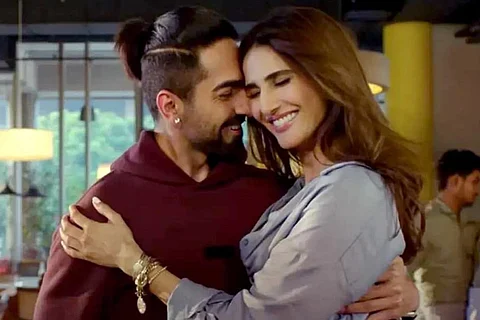

“I was trying to understand, and then I realised there’s nothing to understand!” says an emotional Manu (Ayushmann Khurrana) in the almost-resolution scene in the Hindi film Chandigarh Kare Aashiqui. A line I’m glad made it into the film, since most messaging around cis-trans romantic relationships puts the cis person on a pedestal. I wish there was more of it in the film though, which in Manu’s redemption arc has a lot of ‘bravery’ and ‘strength’ business, which is, frankly, condescending.
So, context: Chandigarh Kare Aashiqui is a typical Bollywood rom-com with a twist. The twist here is that the protagonist is a transgender woman, who is ‘cis-passing’ — that is, she is mistaken for a cisgender woman, a woman assigned female at birth, by most people. The two people at the centre of this story are Manu and Maanvi (played by Vaani Kapoor). It’s love at first sight for the two characters, and while Maanvi wants to reveal her “secret” to Manu, she doesn’t manage to until they reach a critical juncture in their relationship.
To be honest, after I saw the trailer, I expected the worst. The trailer was transphobic, typically sensational, and had Ayushmann Khurrana — the guy who seems to have made it his mission to be Kamal Haasan’s poor, woke, low-budget cousin of the north. But the film surpassed my expectations. It got the basics of gender identity right (which is much more than can be said of Ayushmann’s last queer outing, Shubh Mangal Zyada Saavdhan). It’s sensitively made for a large part, although the director Abhishek Kapoor does try to appease the mass market with transphobic and homophobic “funny” scenes that are peppered through the film. It has an actual trans woman playing a trans woman, although the protagonist herself is played by a cisgender woman. That we get a rom-com featuring a trans woman in the lead is quite a milestone I suppose.
The great thing about the film is that the protagonist Maanvi — who has been portrayed really well by Vaani Kapoor, who at no point played her role for laughs — is never apologetic about her gender. She doesn’t want you to pity her, she wants you to respect her because she’s a human being. She’s trans, she’s a woman going about her business, trying to find love, trying to have adult relationships with her family as she navigates the strains that creep in as we grow into who we are as people. Her character, thankfully, is matter-of-fact — despite some very problematic dialogues the character was made to mouth about surgical transition.
I wish though that some of this matter-of-fact-ness had seeped into how most of the people around Manu — the ones trying to help him get his head on straight — talk about the relationship between him and Maanvi. A psychiatrist that Manu decides to speak to (why is it always a psychiatrist who’s the expert!) tells him because Maanvi had undergone gender affirmation surgery “at the right time”, all he needs now to continue the relationship with her is “himmat”. Strength. Bravery. The minute Manu decides he will continue his relationship with Maanvi because he loves her, he gets a literal medal, in a competition to prove his ‘manliness’. There’s enough musical cues to say, look, now, he’s a hero.
As a person who is in a relationship with a trans woman, I find this patronising. When you send us this message — whether you’re a filmmaker or a well-meaning friend — it tells us you think our partner is somehow “less than”. This is the message cisgender men, especially, are given constantly for pursuing relationships with disabled women, fat women, dark women, women with mental illnesses, sex workers, women who don’t fit into the “generic” cisgender, straight, able-bodied, thin, not-too-short, not-too-tall, fair, soft spoken, elder-respecting mold. Any deviation from this mold, and the non-“less” partner is treated like they’re doing some great self sacrifice, as if they’ve written away 90% of their wealth to charity.
We don’t love trans women because we want to be heroes, or we want to do charity, or we have some sense of superiority. Because that’s not a relationship — that’s a project — and no romantic relationship can survive on project mode. We love who we love, for the same reasons any person falls in love with another. We find them charming, attractive, funny. We feel good when they validate our terrible jokes. We know they’ll stick with us through tragedy and victories. They’ll deliver home cooked food when our whole family gets COVID. They’ll buy Naga Rava for our mother from Chennai to Bengaluru because otherwise our mother cannot cook upma. And they’ll pick us up from 10 km away and hold us tight when our anxiety skyrockets.
We don’t need medals for being a boring partner in a comfortably boring relationship. We don’t need ‘strength’ and ‘bravery’. We just need what anyone who wants to be in a relationship needs: empathy and love. And I wish Chandigarh Kare Aashiqui had understood that, too.
This piece was first published on Here's the thing, an exclusive weekly newsletter for TNM Members.